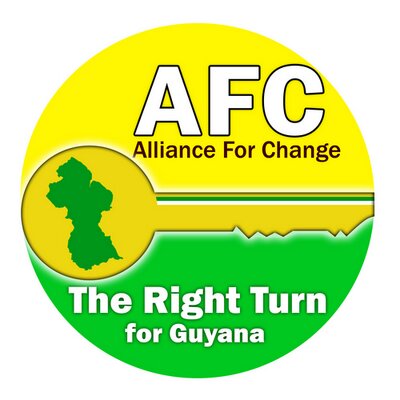The Alliance For Change (AFC) has been “hijacked” by the pro-PNC faction in its executive, according to political analyst, Dr Henry Jeffrey.
Writing in his Future Notes column in Wednesday’s edition of Stabroek News, Jeffrey cited the recent upheaval that had buffeted the governing coalition partner over the unilateral selection of a Gecom Chairman and which led to the withdrawal of its Canadian arm.
Noting that the AFC’s declared purpose on formation in 2005 was to “bridge the racial divide that had resulted from the dominance of the two major ethnic parties (PPP/C and PNCR)” and to transform governance, Jeffrey asserted that the party has not delivered and is now on the defensive.
 “..here we are today: notwithstanding all the promises, governance, far from being transformed appears now set upon a dangerously reactionary course. Indeed, with the AFC firmly asleep in bed with the PNCR, the leader of the latter took to a National Assembly made turbulent by his unilateral decision to select the chairperson of Gecom, trying to hood-wink the Guyanese people that the coalition is ushering in opportunities and laying ‘the basis for a system of inclusionary democracy!’ How and why did this occur?”
“..here we are today: notwithstanding all the promises, governance, far from being transformed appears now set upon a dangerously reactionary course. Indeed, with the AFC firmly asleep in bed with the PNCR, the leader of the latter took to a National Assembly made turbulent by his unilateral decision to select the chairperson of Gecom, trying to hood-wink the Guyanese people that the coalition is ushering in opportunities and laying ‘the basis for a system of inclusionary democracy!’ How and why did this occur?”
Columnist Ralph Ramkarran in his column in the last Sunday Stabroek had also criticised President David Granger’s address to Parliament for suggesting that the coalition’s brand of governance was `winner-does-not-take-it-all’.
Jeffrey, who has had a long association with both the PNCR and the PPP/C, argued that the core of the Canadian chapter’s quarrel with the AFC was that it is managed by an unresponsive oligarchy.
“One only needs to look at how stable their leaderships are to recognise that usually all political parties based upon similar archaic organisational arrangements are oligarchies that behave similarly. Indeed, given its multiethnic nature and the general hostility many in the membership felt against both the PNC and PPP, the decision to join with the PNC, matters not how necessary to oust the PPP/C, was bound to be viewed with suspicion. Nonetheless, it was seen by many both internally and externally as a sensible exercise of leadership. The problem is that the vast majority of those who supported the PNCR/AFC alliance considered it as a relatively short/medium term arrangement to dislodge the PPP/C and implement constitutional reforms and this would have kept the party independent and vibrant in keeping with its founding credo”, Jeffrey stated.
However, Jeffrey said what makes the oligarchy now in charge of the AFC appear more estranged from its membership is that the visions that at present move it and the membership are now miles apart.
“While the membership is still largely motivated by the original vision of an independent party, the leadership now sees its future as intricately and permanently linked to that of the coalition with APNU, and this cannot be successfully explained to the whole membership. The party has been hijacked by the PNC faction lodged in the oligarchy!”, Jeffrey declared.
He said that a good indication of this is found in the fact that the vitality of the AFC as an independent party rests upon some of the most popular aspects of proposed constitutional reform, e.g., post-election coalitions and more autonomous constituencies.
“Yet the victory of the pro-PNC oligarchs has been so decisive that this instrument of the AFC’s liberation and development has been placed in its own hands without its being able to utilise it. Indeed, the AFC’s leadership finds itself in the invidious position of having to publicly justify the ‘progress’ the coalition has made on constitutional reform!”, Jeffrey charged.
A promise by the APNU+AFC coalition of rapid constitutional reform within months of taking office has collapsed. Two and a half years later nothing has begun.
While noting that politics is a dynamic process and things could change Jeffrey said it appeared to him that the AFC oligarchs who lost the contest for leadership of the party have obviously made their peace with the current arrangements and have left the membership on their own.
“All the talk about renegotiating the Cummingsburg Accord (on which the coalition was founded), etc is illusionary. After all the negatives having to do with the implementation of this agreement it is now impossible to transform the current ‘paper’ arrangement into something substantial? But perhaps our political history contains a hopeful lesson for the alienated membership of the AFC. It is said that the party originated in a desire to recreate the 1950s Jagan/Burnham – Ramjattan/Trotman – experiment with national unity and if so, its reemergence may also be located there. On that occasion the split in the oligarchy that controlled the PPP led to Forbes Burnham’s defeat; a split in the party and his subsequent formation of the PNC”, Jeffrey noted.
The AFC is currently being led by former PNCR MP Raphael Trotman. He was a surprise winner at the party’s elections earlier this year over the incumbent Khemraj Ramjattan, a former PPP/C MP. Originally it has been a three-way race for leadership along with Prime Minister Moses Nagamootoo but he withdrew shortly before the election.
The AFC says it was not consulted on Granger’s controversial selection of retired Justice James Patterson as Chairman. However, at the meeting at State House at which Opposition Leader Bharrat Jagdeo was notified, Trotman was present. Neither Trotman nor the AFC has said in what capacity he was present at that meeting. Trotman.
